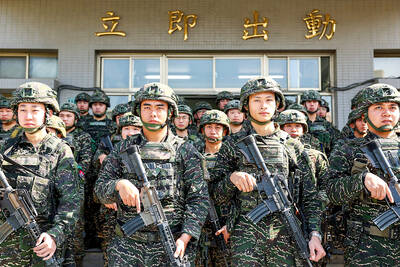This week’s gossip pages have been dominated by tales of male stars misbehaving and a newly crowned best leading actress whose life is far less glamorous than her achievements on the big screen.
Leading the way is television actor Matthew Lin (明道), who found himself under media scrutiny when he recently transferred to Chungyu Institute of Technology (崇右技術學院), the fifth college he has attended. The transfer has been criticized as an attempt to dodge compulsory military service by not graduating.
With his enrollment in Chungyu, the 31-year-old Lin is entering his 11th year of school and continues to ignore his patriotic duty, both the Apple Daily and the Liberty Times (the Taipei Times’ sister newspaper) reported. On his first day of school last Friday, the star made an effort to go to an early morning class, but swiftly took his leave in the afternoon after tackling a swarm of inquisitive reporters who awaited him at the school.

Photo: Taipei times
“I’m not dodging my military service. Everything I’ve done is within the law,” the star said.
But actions like Lin’s may soon become illegal, as the Ministry of the Interior (內政部) is reportedly working on a provision that the media has dubbed “the Matthew Lin clause” (明道條款), which is aimed at ending the practice of avoiding military service by not graduating for years.
In light of recent developments, the Hsing Wu Institute of Technology (醒吾科技學院), a school favored by other alleged draft-dodgers including pop idols Mike He (賀軍翔), Joseph Cheng (鄭元暢) and Ethan Ruan (阮經天), has come up with a set of new rules for its celebrity students. According to the “strict” regulations, those stars will be temporarily suspended from school if they fail to complete at least one course credit or skip classes more than five times in a semester.
Meanwhile, rising pop idol Ko Chen-tung (柯震東) is learning the price of being famous the hard way. Having rocketed to fame after starring in You Are the Apple of My Eye (那些年,我們ㄧ起追的女孩), a local blockbuster directed by best-selling writer Jiubadao (九把刀 or “Nine Knives,” real name Giddens Ko, 柯景騰). The 20-year-old newbie actor has quickly seen his private life become a favorite topic in gossip columns that churn up “negative” news about him doing what a lot of college boys do in their spare time — going clubbing, smoking cigarettes and frolicking with girls.
The Apple Daily recently published a series of video clips showing the star’s more passionate side. In one clip, he shows off his buttocks to a company of male friends. Another clip sees a young man who looks like Ko Chen-tung asking his girlfriend to touch his nipples, but the star denied that he was the man in that video.
While the actor has reportedly cracked up under the media’s relentless pursuit, director Jiubadao is waging a personal war against Next Media. The writer and director’s resentment at the media network began earlier this month when a Next Magazine story tried to link Michelle Chen (陳妍希), the leading lady in Jiubadao’s movie, with a dubious career in the sex industry. To retaliate against Next Media, which he said was trying to “tarnish my goddess,” Jiubadao aborted a joint project with Next TV.
“The media has been bitching about Ko Chen-tung. Why? Is it just because I hate Next Media?” Jiubadao spat.
In film-related news, 63-year-old actress Deanie Ip (葉德嫻) is the subject of rekindled public interest after she was crowned as the best leading actress at the Venice Film Festival last week for her portrait of an aging domestic servant in A Simple Life (桃姐), co-starring Andy Lau (劉德華), to become the first actor in Hong Kong to be awarded the Italian trophy.
Ip reportedly retired from show biz in 2000, and the film is her first since then. The veteran actress called her award a “miracle” and said she owed the honor to her lifelong friend Lau, who encouraged her to take up the project.
Hong Kong media also reported that the divorced actress has led a lonely life for the past few years, estranged from her two children and four sisters. Ip told the press that her family has already sent congratulation notes and that was enough for her.

That US assistance was a model for Taiwan’s spectacular development success was early recognized by policymakers and analysts. In a report to the US Congress for the fiscal year 1962, former President John F. Kennedy noted Taiwan’s “rapid economic growth,” was “producing a substantial net gain in living.” Kennedy had a stake in Taiwan’s achievements and the US’ official development assistance (ODA) in general: In September 1961, his entreaty to make the 1960s a “decade of development,” and an accompanying proposal for dedicated legislation to this end, had been formalized by congressional passage of the Foreign Assistance Act. Two

President William Lai’s (賴清德) March 13 national security speech marked a turning point. He signaled that the government was finally getting serious about a whole-of-society approach to defending the nation. The presidential office summarized his speech succinctly: “President Lai introduced 17 major strategies to respond to five major national security and united front threats Taiwan now faces: China’s threat to national sovereignty, its threats from infiltration and espionage activities targeting Taiwan’s military, its threats aimed at obscuring the national identity of the people of Taiwan, its threats from united front infiltration into Taiwanese society through cross-strait exchanges, and its threats from

Despite the intense sunshine, we were hardly breaking a sweat as we cruised along the flat, dedicated bike lane, well protected from the heat by a canopy of trees. The electric assist on the bikes likely made a difference, too. Far removed from the bustle and noise of the Taichung traffic, we admired the serene rural scenery, making our way over rivers, alongside rice paddies and through pear orchards. Our route for the day covered two bike paths that connect in Fengyuan District (豐原) and are best done together. The Hou-Feng Bike Path (后豐鐵馬道) runs southward from Houli District (后里) while the

March 31 to April 6 On May 13, 1950, National Taiwan University Hospital otolaryngologist Su You-peng (蘇友鵬) was summoned to the director’s office. He thought someone had complained about him practicing the violin at night, but when he entered the room, he knew something was terribly wrong. He saw several burly men who appeared to be government secret agents, and three other resident doctors: internist Hsu Chiang (許強), dermatologist Hu Pao-chen (胡寶珍) and ophthalmologist Hu Hsin-lin (胡鑫麟). They were handcuffed, herded onto two jeeps and taken to the Secrecy Bureau (保密局) for questioning. Su was still in his doctor’s robes at